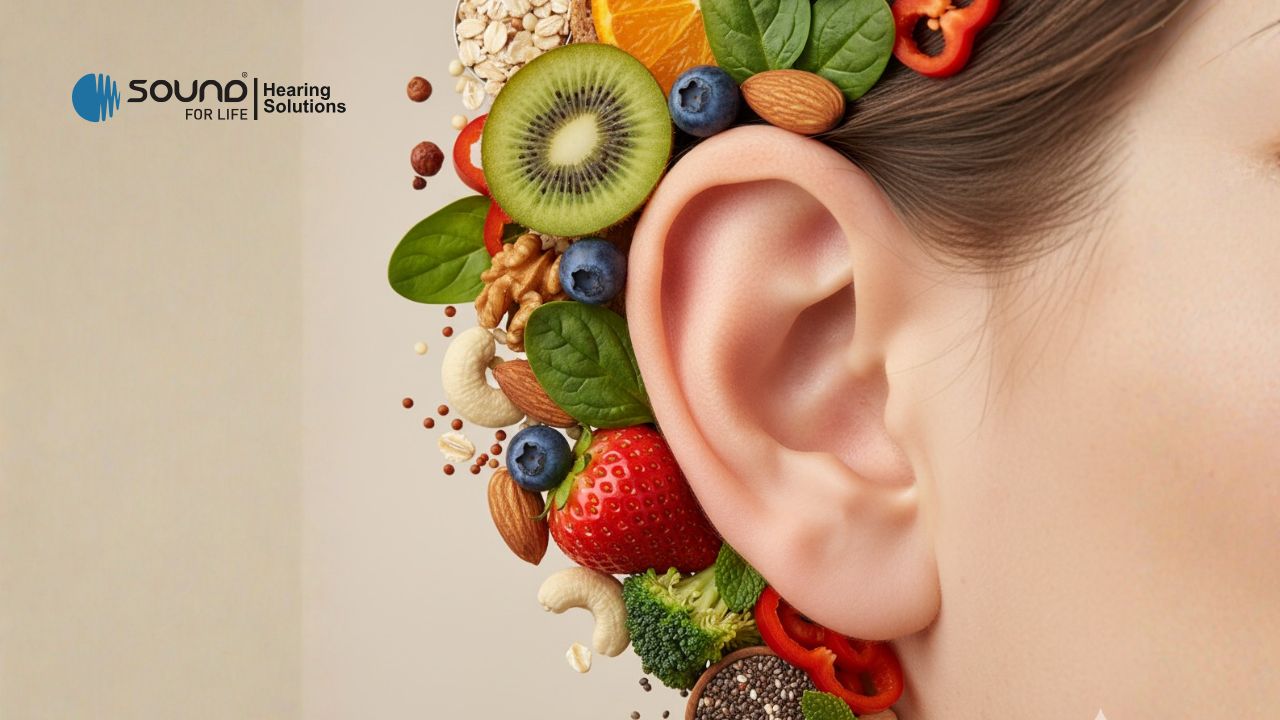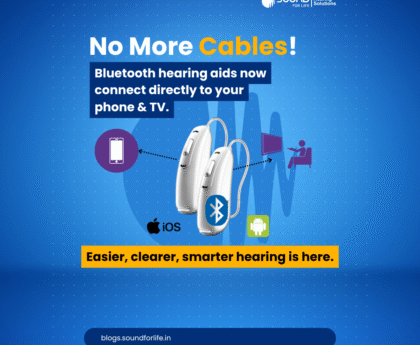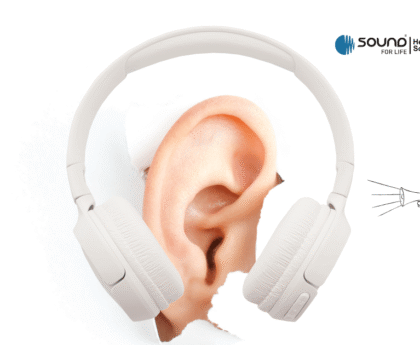Hearing connects us to the people and things around us. We typically worry about how to keep our ears safe from loud noises or how to get regular hearing examinations. But what we eat is equally important. Eating well can help keep the small, fragile portions of the ear safe and may lessen the likelihood of hearing difficulties in the future. This article discusses how food affects hearing, which nutrients are best for it, and easy methods to get more of them into your daily life.
What nutrients help in hearing health?
Foods rich in vitamins A, C, E, B12, folate, magnesium, zinc, and omega-3s protect ear cells, support nerve health, and improve blood flow. Eating fruits, vegetables, nuts, seeds, and fish regularly can naturally support better hearing.
How does nutrition affect hearing?
A balanced diet improves circulation, reduces oxidative stress, and supports nerve health , all essential for maintaining healthy ears and preventing hearing loss.
Can poor diet cause hearing loss?
Yes, nutritional deficiencies can affect the inner ear’s blood flow and cell protection, increasing the risk of hearing damage over time.
Which foods should I avoid for ear health?
Limit salt, sugar, processed foods, and smoking. These habits can harm circulation and increase risks of tinnitus or hearing issues.
When should I consult an audiologist?
If you experience ringing in your ears, sudden hearing changes, or difficulty understanding speech, visit SFL Hearing Solutions for a professional hearing test.
How does food affect your hearing?
Inside your ear is the cochlea, a tiny, spiraled organ with hair cells that turn sound into signals for your brain. These hair cells are fragile. Good nutrition helps in three big ways:
- Fights damaging molecules (oxidative stress): Antioxidants from food neutralize free radicals that can harm ear cells.
- Improves blood flow: The inner ear needs a steady supply of oxygen and nutrients. Foods that support healthy circulation help the cochlea work well.
- Supports nerves: Hearing depends on healthy nerves. Vitamins and minerals that support nervous system health help keep hearing sharp.
Key Nutrients for Healthy Hearing
Here are the nutrients most linked to better hearing — with easy food sources you can find at any market.
1. Vitamin A
- Helps keep the tissues in the ear healthy and reduces oxidative stress.
- Eat: Carrots, sweet potatoes, spinach, kale, mangoes.
2. Vitamin C
- A strong antioxidant that protects hair cells and supports immunity (helps reduce ear infections).
- Eat: Oranges, lemons, guava, papaya, strawberries, bell peppers.
3. Vitamin E
- Works with vitamin C to protect cells from damage and may slow age-related hearing loss.
- Eat: Almonds, sunflower seeds, spinach, avocado, peanut butter.
4. Vitamin B12
- Vitamin B12 is crucial for nerve health. This vitamin is essential for keeping nerves healthy.
- Eat: Lean meat like chicken and lamb, Eggs, fish like salmon and mackerel, milk, and fortified cereals.
5. Folic Acid (Vitamin B9)
- Folic acid helps reduce homocysteine levels in the blood. High homocysteine is associated with poor blood flow to the inner ear, increasing the risk of hearing loss.
- Eat: Spinach, lentils, chickpeas, asparagus, avocado.
6. Magnesium
- Magnesium supports blood flow to the inner ear and protects against noise-induced hearing loss.
- Eat: Bananas, almonds, spinach, pumpkin seeds, dark chocolate.
7. Zinc
- Important for immune health and repairing cells — useful if you have ear infections.
- Eat: Pumpkin seeds, cashews, chickpeas, meat, seafood, whole grains.
8. Omega-3 Fatty Acids
- Reduce inflammation and improve circulation both good for the inner ear.
- Eat: Fatty fish (salmon, mackerel, sardines), walnuts, flaxseeds, chia seeds.
Other helpful dietary ideas
- Choose whole foods: Fresh fruits, vegetables, whole grains, lean proteins, nuts, and seeds give many nutrients at once.
- Eat colorful meals: Different colors usually mean different vitamins and antioxidants.
- Keep hydrated: Water helps maintain fluid balance in the inner ear.
- Avoid nutrient-poor processed foods: These are often high in salt, sugar, and unhealthy fats.
Foods and habits to avoid for Hearing Health
Some foods and habits can hurt hearing health over time:
- Too much salt: Can change fluid balance in the ear and worsen tinnitus (ringing).
- Excess sugar: Raises the risk of diabetes, which is linked to hearing loss.
- Highly processed foods: Often lack vitamins and increase inflammation.
- Heavy caffeine or alcohol: In very large amounts may affect circulation and hearing for some people.
- Smoking: Harms blood vessels and is bad for hearing.
Simple Daily Meal Plan for Healthy Hearing
Here’s a simple plan to include hearing-friendly nutrients without making big changes.
1. Breakfast
- Spinach and mushroom omelet (vitamins A, B12)
- Fresh orange juice or a whole orange (vitamin C)
- A handful of almonds (vitamin E, magnesium)
2. Lunch
- Grilled salmon with quinoa and mixed vegetables (omega-3s, magnesium, B vitamins)
- Salad with avocado and bell peppers (vitamins E and C, folate)
3. Snack
- Guava or papaya slices (vitamin C)
- Pumpkin seeds (zinc, magnesium)
4. Dinner
- Lentil soup with spinach and carrots (folate, vitamin A, vitamin C)
- Whole grain roti or brown rice (B vitamins, zinc)
5. Evening
- A small bowl of walnuts or a teaspoon of flaxseeds (omega-3s)
Small, practical ways to add these foods in your daily diet
- Add a handful of spinach to your morning omelet or smoothie.
- Keep walnuts or almonds as easy snacks.
- Add beans or lentils to soups and salads twice a week.
- Replace white rice with brown rice or millet occasionally.
- Grill or bake fatty fish twice a week, or use walnuts/flax if you prefer vegetarian options.
When to be careful about supplements
Supplements can help when a person is deficient, but they are not always necessary and can interact with medicines. Always check with your doctor or an audiologist before starting any supplement especially if you take other medications, have health conditions, or are pregnant.
Other lifestyle tips that help hearing
Nutrition is powerful but it works best with healthy habits:
- Limit loud noise exposure: Wear ear protection at concerts, on job sites, or when using loud tools.
- Exercise regularly: Good circulation helps ear health.
- Avoid smoking and limit alcohol: Both affect blood flow and ear health.
- Get regular hearing check-ups: Early detection helps treat problems before they get worse.
- Talk to your doctor about medicines: Some medicines can affect hearing (known as ototoxic drugs); ask your healthcare provider for alternatives if needed.
When to see a specialist?
If you notice any of the following, make an appointment with an audiologist or an ENT doctor. These warnings aren’t normal and deserve a professional check. If you’re unsure, it’s always better to check early treatment often brings better results.
1. Ringing or buzzing in your ears (tinnitus)
- If you hear a constant or recurring ringing, buzzing, hissing, or whooshing sound, tell a specialist. Tinnitus can come from many causes such as earwax, infections, noise damage, or other health issues and an expert can find the cause and suggest ways to reduce it.
2. Having trouble understanding speech, especially in noisy places
- If friends or family tell you you’re asking them to repeat themselves, or you find it hard to follow conversations in restaurants, buses or meetings, it’s time to get tested. A hearing test can show whether you have hearing loss and what kind it is, and the specialist can recommend devices or strategies to help.
3. Sudden change or sudden loss of hearing
- If one or both ears become quieter very quickly (over hours or a day), treat it as urgent, contact an ENT right away. Sudden hearing loss sometimes can be treated successfully if you get care fast.
4. Ear pain, discharge, or repeated ear infections
- If untreated, recurrent ear infections, fluid leaking from the ear, or persistent ear discomfort can all impair hearing. A medical professional will check your ear, treat any infection, and give you advice on how to avoid such issues in the future.
What to expect at your visit: The specialist will ask about your symptoms and medical history, look inside your ear, and likely do a hearing test. Depending on the results, they may suggest treatment, hearing aids, or follow-up tests.
FAQ:
Vitamins A, C, E, B12, and folate help protect ear cells and nerves. Foods like spinach, guava, almonds, and salmon are excellent for hearing health.
Yes. A nutritious diet improves blood flow and reduces ear cell damage, helping prevent hearing loss naturally.
Lentils, spinach, guava, mango, papaya, walnuts, and fish like mackerel and sardines support hearing health naturally.
Supplements may help if you have deficiencies, but food sources are better. Always consult an audiologist before taking supplements.
If you notice ringing, ear pain, or difficulty hearing conversations, schedule a test at SFL Hearing Solutions for early detection and expert advice.
Final thoughts
A healthy, balanced diet provides your ears the building blocks they need for good hearing health and to keep ear muscle healthy and strong. By eating a wide variety of colourful fruits and vegetables, whole grains, nuts, seeds, lean proteins and fatty fish, you’re giving your body and your hearing real support over time. Pair good food with regular exercise, sensible noise protection, and routine check-ups, and you’ll be doing everything possible to protect your hearing for years to come.
At SFL Hearing Solutions we’re with you every step of the way. Good eating is an excellent first step, but expert care makes the difference when problems appear. If you have questions or want your hearing checked, get in touch with us today to book an appointment. We are here to help you hear better and live a better life.
Disclaimer: This article is for general information only and is not medical advice. If you have hearing problems or medical conditions, please consult a qualified healthcare professional before changing your diet or starting supplements.





